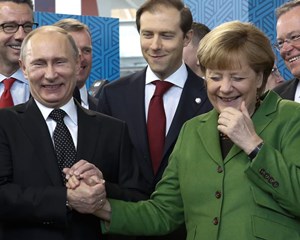Pundits differ on whether the turning-point in German-Russian relations was Mr Putin's annexation of Crimea in 2014, the Kremlin-directed hacking of the Bundestag's computer systems in 2015 or the killing in 2019 of a Chechen dissident in a Berlin park. Yet all agree that the poisoning last year of Alexei Navalny, the Kremlin's leading opponent, was the last straw. "German-Russia relations are at the lowest point since the end of the cold war, and they will deteriorate further still," says Stefan Meister of the DGAP, a think-tank in Berlin. Mr Putin uses the conflict with the West to drum up nationalist support for his regime. He will become even more authoritarian, predicts Mr Meister, by increasing pressure on Russian media and nongovernmental organisations.
對于德俄關系的轉(zhuǎn)折點是普京在2014年吞并克里米亞,還是克里姆林宮指使的2015年德國聯(lián)邦議院計算機系統(tǒng)遭到黑客攻擊,抑或是2019年在柏林公園殺害一名車臣異見人士,專家們意見不一。然而,所有人都認為,去年克里姆林宮主要對手阿列克謝·納瓦爾尼中毒事件是最后一根稻草。“德俄關系正處于冷戰(zhàn)結(jié)束以來的最低點,而且還會進一步惡化,”柏林智庫DGAP的斯特凡·梅斯特表示。普京利用與西方的沖突來爭取民族主義者對其政權(quán)的支持。梅斯特預測,通過加大對俄羅斯媒體和非政府組織的壓力,普京將變得更加專制。

According to Andrey Kortunov, the head of the Russian International Affairs Council, a foreign-affairs think-tank in Moscow, the Russian government has no desire to increase tensions with Germany. It expects continuity with Mrs Merkel's policies if Armin Laschet, her party's candidate, becomes the next chancellor. If, however, the next chancellor is the Greens' Annalena Baerbock, who opposes Nord Stream 2, Germany looks likely to get tougher with Russia. Either way, long gone are the too-cosy days of Mr Schrder, who once called Mr Putin a "flawless democrat", and who is now the chairman of both Rosneft, Russia's state-controlled oil company, and Nord Stream 2.
俄羅斯國際事務委員會(位于莫斯科的一家外交事務智庫)主席安德烈·科爾圖諾夫表示,俄羅斯政府無意加劇與德國的緊張關系。如果阿明·拉謝成為下一任總理,它希望默克爾的政策能夠繼續(xù)。然而,如果下一任總理是綠黨的阿娜蕾娜·拜爾波克(她反對北溪2號項目),那么德國可能會對俄羅斯采取更加強硬的態(tài)度。不管怎樣,施羅德過于安逸的日子早已一去不復返了。施羅德曾稱普京是“完美的民主主義者”,他現(xiàn)在是俄羅斯國有石油公司Rosneft和北溪2號的董事長。
譯文由可可原創(chuàng),僅供學習交流使用,未經(jīng)許可請勿轉(zhuǎn)載。











